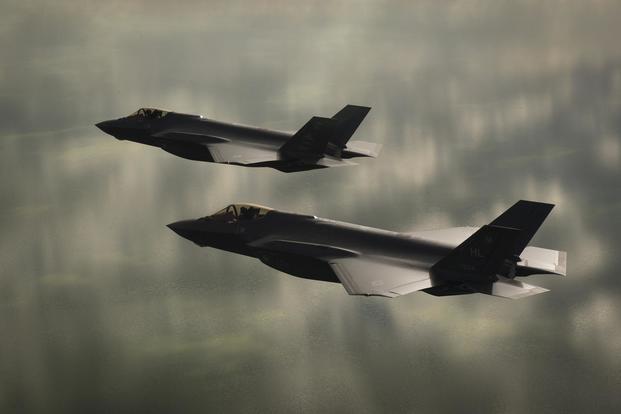Military officials on Thursday confirmed that the Defense Department has temporarily suspended acceptance of new F-35 Joint Strike Fighters over corrosion issues.
The suspension has been in place "for a few weeks" but is not expected to impact any major training or operational missions, said Lt. Gen. Arnold Bunch, the Air Force's military deputy for the Office of the Assistant Secretary for Acquisition at the Pentagon.
News of the temporary pause was first reported by Reuters on Wednesday.
The issue stems from corrosion in fastener "holes that were drilled and not corrected or properly treated found during an inspection at Hill Air Force Base, [Utah]," Bunch said during a House Armed Services subcommittee on Tactical Air and Land Forces. He did no elaborate if it pertains to specific fastener holes in a part of the aircraft, or throughout the entire aircraft.
"We do not see it as a long-term problem, and if we have an operational need for the aircraft, we have discussed [it] with [Vice] Adm. [Mat] Winter," he said referring to the director of the F-35 Joint Program Office.
Related content:
- As Services Take Greater Role on F-35, Joint Program Office to Remain
- New Precision Weapon Allows F-35C to Destroy Targets in Stealth Mode
- Lockheed Negotiating Tactics Delaying F-35 Deal, Program Director Says
"He's willing to work with us [so] if we need the aircraft for an operational need we will work with him to get those aircraft out of the hold that they're on right now," Bunch said.
Fourteen of the Lot 10 F-35 aircraft have been delivered to the military, Bunch said, but five remain with Lockheed: three F-35As for the Air Force, one for Norway and one for Australia.
Speaking with reporters after the hearing, Bunch said he believes it's not just F-35As that are affected, but could not speak to how many B or C models remain backlogged.
"I can't see that [this issue] would be just us," Bunch said. "All of the F-35s are going through [the same inspection] right now."
Bunch said the corrosion issue is not the same as the corrosion found in the lines back in Sept. 2016. The Air Force grounded 13 out of 104 F-35s in the fleet then, "due to the discovery of peeling and crumbling insulation in avionics cooling lines inside the fuel tanks," the service said at the time.
According to the Reuters report, the Pentagon stopped accepting deliveries of the plane and officials are in discussions with Lockheed Martin, the F-35's manufacturer, about who should pay for the costs.
"This is purely about who is responsible [for] cost," Vice Adm Paul Grosklags, commander of the Naval Air Systems Command, said during the hearing alongside Bunch and other top aviation brass.
"I agree with Adm. Winter's decision about suspending delivery of those aircraft, because quite honestly, this is a mistake made by the contractor during production, and they should pay for that out of their bottom line, not out of our topline [budget]," Grosklags said.
The Joint Program Office said those discussions are ongoing.
"Per the direction of the program executive officer, F-35 deliveries have been temporarily paused while the government and Lockheed Martin reach an agreement on a contractual issue regarding repair work to remediate the known aircraft fastener hole primer quality escape," JPO spokesman Joe DellaVedova told Military.com.
"This is not a safety of flight issue but rather a contractual resourcing issue that needs to be resolved," he said in a statement Thursday. "The government has implemented this pause to ensure the warfighter receives a quality product from industry. We look forward to a swift resolution of this issue."
The latest news comes after Winter publicly condemned Lockheed recently not only for continued high costs within the program but also for poor manufacturing.
"I am not satisfied in the following areas: the price is coming down, but it's not coming down fast enough," Winter said on Feb. 28.
"We don't know, to the level of granularity that I want to know, what it actually costs to produce an aircraft," he said. "And the number of quality escapes and what we call production line defects needs to get better."
-- Oriana Pawlyk can be reached at oriana.pawlyk@military.com. Follow her on Twitter at @orianapawlyk.










